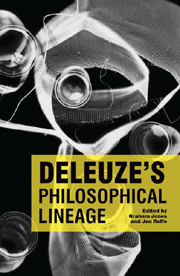Book contents
- Frontmatter
- Contents
- Acknowledgements
- List of Abbreviations
- Introduction: Into the Labyrinth
- 1 Plato
- 2 John Duns Scotus
- 3 G. W. F. Leibniz
- 4 David Hume
- 5 Immanuel Kant
- 6 Solomon Maimon
- 7 G. W. F. Hegel
- 8 Karl Marx
- 9 Hoëne Wronski and Francis Warrain
- 10 Bernhard Riemann
- 11 Gabriel Tarde
- 12 Sigmund Freud
- 13 Henri Bergson
- 14 Edmund Husserl
- 15 A. N. Whitehead
- 16 Raymond Ruyer
- 17 Martin Heidegger
- 18 Pierre Klossowski
- 19 Albert Lautman
- 20 Gilbert Simondon
- Bibliography
- Notes on Contributors
- Index
6 - Solomon Maimon
Published online by Cambridge University Press: 12 September 2012
- Frontmatter
- Contents
- Acknowledgements
- List of Abbreviations
- Introduction: Into the Labyrinth
- 1 Plato
- 2 John Duns Scotus
- 3 G. W. F. Leibniz
- 4 David Hume
- 5 Immanuel Kant
- 6 Solomon Maimon
- 7 G. W. F. Hegel
- 8 Karl Marx
- 9 Hoëne Wronski and Francis Warrain
- 10 Bernhard Riemann
- 11 Gabriel Tarde
- 12 Sigmund Freud
- 13 Henri Bergson
- 14 Edmund Husserl
- 15 A. N. Whitehead
- 16 Raymond Ruyer
- 17 Martin Heidegger
- 18 Pierre Klossowski
- 19 Albert Lautman
- 20 Gilbert Simondon
- Bibliography
- Notes on Contributors
- Index
Summary
Who was Maimon?
Shlomo ben joshua (1753–1800) was a Polish-Russian rabbi from a humble, poverty-stricken background. Never having been to university he learnt philosophy through the Talmudic tradition and his own eclectic reading, and took the name Maimon in homage to the Spanish, Jewish philosopher Moses Maimonides whom he greatly admired. Exiled from his Polish community because of his heretical views, Maimon travelled throughout Europe before finally settling in Germany where, socially inept, uncouth and evil-tempered, it is said he would recount, in the taverns where he wrote most of his works, his disgrace for the price of a drink. There, filled with ambition, he immersed himself in various intellectual debates whilst working his way through the history of philosophy. After reading Kant, who claimed to have resolved the dispute between rationalism and empiricism, Maimon set out to write a commentary on Kant's Critique of Pure Reason, which would also outline the general principles of his own philosophy (which he referred to as a ‘Koalition-system’), an ingenious attempt at synthesising and reconciling the differing and seemingly incompatible positions of Leibniz, Hume and Kant. This document, called the ‘Essay on Transcendental Philosophy’, both mammoth in size and written in idiosyncratic German, was eventually passed on to the ageing Kant who grudgingly acknowledged ‘that none of my opponents had understood me so well, but that very few could claim so much penetration and subtlety of mind in profound inquiries of this sort’.
- Type
- Chapter
- Information
- Deleuze's Philosophical Lineage , pp. 104 - 129Publisher: Edinburgh University PressPrint publication year: 2009



